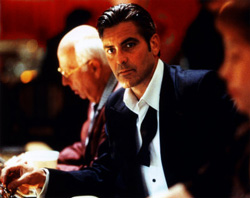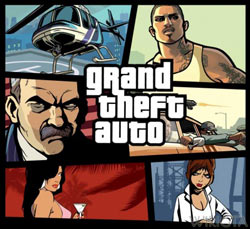
But you have to wonder, if you had just stopped into your bank to deposit some checks and maybe get rid of all those rolled nickels filling up the third drawer in the lowboy by the side door, and a bunch of guys walked in wearing ski masks and toting automatic weapons and shouting commands and profanity at you and your fellow patrons, would you think “This is awesome!” or would you think “Good thing it’s laundry day!”? My guess is the latter.
So whence comes this cognitive dissonance? Why are we strongly attracted to things in art (let’s just use this loaded word for shorthand and not get into whether or not, say, The Closer, is art) that we would give our last rolled nickel to avoid in real life? Should not all “good” people desire programming featuring nothing but charming rabbits, community activities where people help each other (Barn raising! Blanket toss! Sing-alongs!), or footage of verdant gardens? Shouldn’t we ask our poets for more “I Wandered Lonely As a Cloud” and for less “Howl”? More “Still Life with Cherries” and much less “Saturn Devouring His Children” of our painters? And so on. Point made. But, I’ll wager, not taken! Indeed, we do not in art cleave to what we want in life.
Why? Are we all secretly sociopaths? Do we all kind of sort of want to rob banks or mug people or get into car chases? Do we want to shoot people? Think about how much gunplay you will see on a typical night watching broadcast television and/or basic cable. And in the theaters? Pretty much forget it—every other scene in your average blockbuster is an explosion or fistfight or running gun battle; things that if they happened to the average civilian would become the story of that person’s life (and possibly a source of PTSD).
 Things that we enjoy watching or reading about are often things we would hate to experience. That’s kind of the obvious, unsupported thesis. Now here’s some evidence of why this is clearly true: every single culture for as long as there has been a thing called “culture” has had its own versions of this phenomenon. Think about medieval morality plays. Think about the stories of Narcissus or Sisyphus. Think about Othello or Macbeth (or, I dunno, all of Shakespeare’s tragedies, pretty much. Oh, and much of his poetry, too). Think about The Scarlet Letter (keeping in mind that adultery was legally akin to, say, orphan stabbing in the era of the tale and still quite frowned upon at the time of writing and now it’s this kind of run-of-the-mill thing and isn’t that sad and isn’t this parenthetical too long?).
Things that we enjoy watching or reading about are often things we would hate to experience. That’s kind of the obvious, unsupported thesis. Now here’s some evidence of why this is clearly true: every single culture for as long as there has been a thing called “culture” has had its own versions of this phenomenon. Think about medieval morality plays. Think about the stories of Narcissus or Sisyphus. Think about Othello or Macbeth (or, I dunno, all of Shakespeare’s tragedies, pretty much. Oh, and much of his poetry, too). Think about The Scarlet Letter (keeping in mind that adultery was legally akin to, say, orphan stabbing in the era of the tale and still quite frowned upon at the time of writing and now it’s this kind of run-of-the-mill thing and isn’t that sad and isn’t this parenthetical too long?).
Okay, so we have always been this way, we homo sapiens sapiens (Hss) thinking ape people. I ask again, are we all—and have we always been—sociopathic, then? Answer: Yes. Wait, I meant no. The answer is no. Take a look at that word, and note the first three syllables, “socio.” That means pertaining to “society” (or the act or state of being “social”). The fact that tales of, to put it simply, “bad things” cropped up along with society points not to a species of latent thieves and murderers but rather to a creature preternaturally averse to crime, averse to hurting others. Thus these cautionary tales. Now, we have evolved as a society, and thus our morality plays of today may well be wrapped in the guise of, say, Grand Theft Auto XII – GTA on the Moon! (how ’bout it, Rockstar Games?) or maybe the noir writing of Dashiell Hammett or, say, Breaking Bad. But the intent is still there: do not do these things, for they are wrong. By seeing them, we learn from the experience of others. The lines grow ever murkier between entertainment and parable, but the intent, somewhere deep down, remains the same.
So crime is not cool, unless it is on TV. And it doesn’t pay . . . unless you are a TV exec.
Steven John has been an avid reader for as long as he can remember, and has been writing for almost that long as well. Most of his early writing you will never, ever see. But as for some of his more recent writing, namely his debut novel Three A.M., he admonishes you to read it and force—er, ask—all your friends to do the same. He is currently at work on his third novel and a host of side projects. Track his wanderings at www.StevenJohnBooks.com.
Read all posts by Steven John for Criminal Element.
